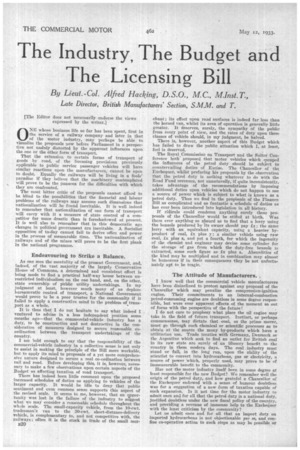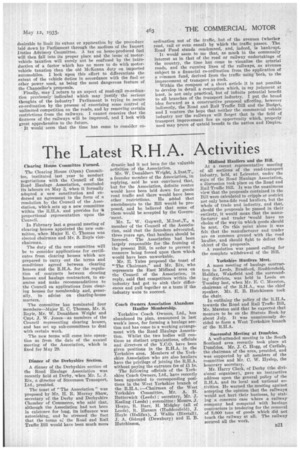The Industry, The Budget and The Licensing Bill
Page 38

Page 39

If you've noticed an error in this article please click here to report it so we can fix it.
By Lieut.-Col. Alfred Hacking, D.S.O., M.C, M.Inst.T.,
Late Director, British Manufacturers' Section, S.M.M. and T.
[The Editor does not necessarily endorse the views expressed by the writer.]
ONE whose business life so far has been spent, first in the service of a railway company and later in that of the motor industry, may perhaps be able to visualize the proposals now before Parliament in a perspective not unduly distorted by the apparent influences upon the one or the other form of transport. That the extension to certain forms of transport of goods by road, of the licensing provisions previously applicable to public service passenger vehicles will have similar reactions upon the manufacturers, cannot be open to doubt. Equally the railways will be living in a fools' paradise if they believe that the machinery contemplated will prove to be the panacea for the difficulties with which they are confronted.
The most bitter critic of the proposals cannot afford to be blind to the possibilities that the financial and labour problems of the railways may assume such dimensions that nationalization will be found inevitable. It is well indeed to remember that nationalization of one form of transport will carry with it a measure of state control of a competitor far more drastic than is foreshadowed at present. It is well also to remember that in this democratic age changes in political government are inevitable. A Socialist opposition of to-day cannot fail to derive office and power in the process of measurable time. The nationalization of railways and of the mines will prove to be the first plank in the national programme. .
Endeavouring to Strike a Balance.
As one sees the mentality of the present Government, and, indeed, of the vast majority of the largely Conservative House of Commons, a determined and consistent effort is being made to find a practical half-way house between unrestricted individualism on the one hand, and, on the other, state ownership of public utility undertakings. In my judgment at least, however much many of us deplore bureaucratic control of transport, a National Government would prove to be a poor trustee for the community if it failed to apply a constructive mind to the problem of transport as a whole.
It is thus that I do not hesitate to say what indeed I ventured to advise in a less independent position some months ago—that the commercial-vehiele industry has a duty, to be constructive and not destructive in the consideration of measures designed to secure reasonable coordination between the transport undertakings of the country.
I am bold enough to say that the responsibility of the commercial-vehicle industry in a collective sense is not only to assist in making the principle of the Bill more workable, but to apply its mind to proposals of a yet more comprehensive nature designed to secure a real co-ordination between rail and road. Before developing this, it is, however, necessary to make a few observations upon certain aspects of the Budget as affecting taxation of road transport.
There has indeed been little comment upon the proposed increased schedules of duties as applying to vehicles of the larger capacity. It would be idle to deny that public sentiment and even common sense supports this aspect of the revised scale. It seems to me, however, that an opportunity was lost in the failure of the industry to suggest what we may consider a reasonable schedule throughout the whole scale. The small-capacity vehicle, from the 10-cwt. tradesman's van to the 30-cwt. short-distance-delivery vehicle, is complementary to, and not competitive with, the railways; often it is the stock in trade of the small mer lin chant; its effect upon road surfaces is indeed far less than the horsed van, whilst its area of operation is generally little greater. It deserves, surely, the sympathy of the public from every point of view, and the rates of duty upon these classes of vehicle should, in my judgment, be halved.
There is, however, another aspect of this Budget which has failed to draw the public attention which I, at least, feel is deserved.
The Royal Commission on Transport and the Salter Conference both. proposed that motor vehicles which escaped the influences of the petrol duty should be subject to countervailing duties of Excise. The Chancellor of the Exchequer, whilst prefacing his proposals by the observation that the petrol duty is nothing whatever to do with the Road Fund revenues, not unnaturally, if quite inconsistently, takes advantage of the recommendations by imposing additional duties upon vehicles which do not happen to use a source of power which is subject to what is known as petrol duty. Thus we find in the prophsals of the Finance Bill as complicated and as fantastic a schedule of duties as has over been introduced into legislation in all history.
If ridicule could condemn anything surely these prdposals of the Chancellor would be stifled at birth. Was there ever anything so absurd as to find that a lorry using the benzole produced by its owner should pay Lx; the same lorry with an equivalent capacity, using a heavier byproduct a coal, ix plus y; a similar vehicle using raw coal, ix plus z, and yet a fourth, for which the ingenuity of the chemist and engineer may devise some cylinder for the storage of gas from which the duty-free benzole is extracted, some such figure as ix plus a. Absurdities 4.4 the kind may be multiplied and in combination may almost be humorous if in their consequences they be not unfortunately apt to be tragic.
The Attitude of Manufacturers. , I know well that the commercial vehicle manufacturers have been disinclined to protest against any proposal of the Chancellor which may penalize the compression-ignition engine. Their commitments to an internal-combustion petrol-consuming engine are doubtless in some degree responHale, but were ever apparent effects of the moment so out of focus with the perspective of the future!
I do not care to prophesy what place the oil engine may take in the field of future transport. Instinct, or perhaps commonsense, may dictate that coal, as the prime mover, must go through such chemical or scientific processes as to obtain at the source the many by-products which have a utilitarian use. Trade treaties with Germany, Denmark or the Argentine which seek to find an outlet for British coal in its raw state are sorely of an illusory benefit to the country in these modern days. The coal industry must stand or fall, in the long run, upon the ability of the scientist to convert into hydrocarbons, gas or electricity, a source of power .Which, properly used, may prove to be of immeasurable benefit to the community.
Has not the motor industry itself been in some degree at least responsible for the new Budget? We remember well the origin of the petrol duty, and how grateful a Chancellor or the Exchequer endowed with a sense of humour doubtless was for a suggestion of a new form of taxation capable of such expansion. Is it not time for the motor industry to admit once and for all that the petrol duty is a national duty, justified doubtless under the new fiscal policy of the country, and providing a revenue of immense help to the Exchequer with the least criticism by the community?
Let us admit once and for all that an import duty on imported ,hydrocarbons is not objectionable per se, and confine co-operative action to such steps as may be possible, or
desirable to limit its extent or application by the procedure laid down by Parliament through the medium of the Import Duties Advisory Committee. A tax on home-produced fuel will then fall into its proper place and the issue of motorvehicle taxation will surely net be confused by the introduction of a factor which has no more to do with motorvehicle taxation than the old McKenna duty on imported automobiles. I look upon this effort to differentiate the extent of the vehicle duties in accordance with the fuel or other power used, as being the most dangerous feature of the Chancellor's proposals.
Finally, may I return to an aspect of road-rail co-ordination previously indicated which may justify the serious thoughts of the industry? Parliament is trying to secure co-ordination by the process of exercising some control of unlimited competition on the roads, and by removing certain restrictions from the railways. I cannot conceive that the finances of the railways will be improved, and I look with great apprehension to the future.
It would seem that the time has come to consider co ordination not of the traffic, but of the avenues (whether road, rail or even canal) by which the traffic passes. The Road Fund stands condemned, and, indeed, is bankrupt.
It would seem to me that, as much in the community interest as in that of the road or railway undertakings of the country, the time has come to visualize the arterial. roads, am] the running lines of the railways, as aVenues subject to a financial co-ordination from the application of a common fund, derived from the traffic using both, to the improvement of transport as such. Within the compass of a short article it is not possible to develop in detail a conception which, in my judgment at least, is not only practical, but of infinite potential benefit to all branches of the transport industry. I put the broad idea forward as a constructive proposal affecting, however indirectly, the Road and Rail Traffic Bill and the Budget, and I venture the hope that neither the commercial vehicle industry nor the railways will forget that in the field of transport improvement lies an opportunity which, properly used may prove of untold benefit to the nation and Empire.




































































































